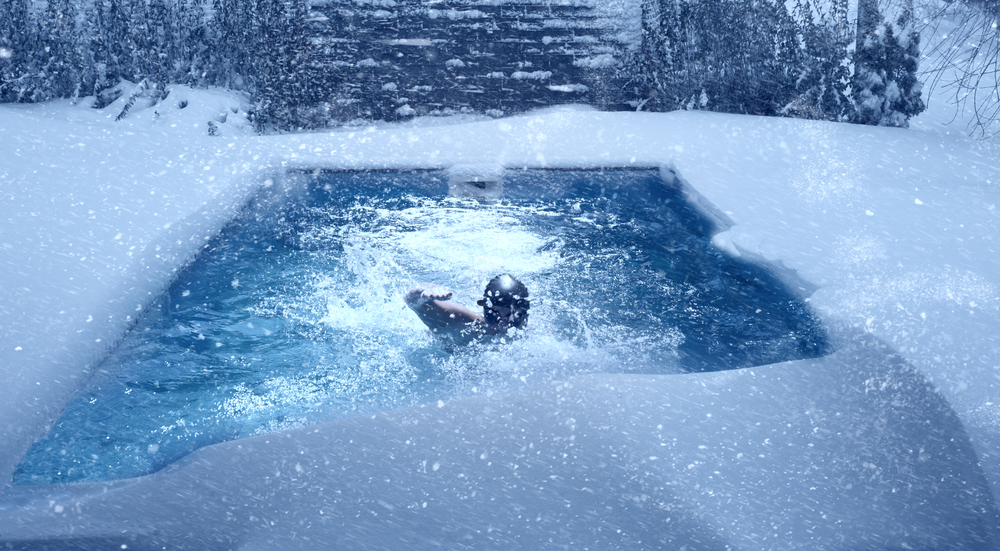Have you long dreamed of adding more months to your swim season? If so, you will want to read on then give your pool contractor a call and ask about adding a swimming pool heater to extend the swim season. In some areas of the country, heaters make sense and can keep the water at swimmable levels, in other parts of the country, the pool heater may need to work too hard to keep up with frigid below zero temperatures and you’ll pay more money than the heat benefit you’re reaping.
Swimming pool heaters help extend a pool season or they are lovely to just take that bit of a nip off the pool water when the season is winding down or if the sun just isn’t doing its job! There are four different types of pool heating systems and you will need to decide on your:
- Budget
- Unique heating needs
- Location of your house
- Area of the country in which you live , and the size and location of your house: electric pool heaters, propane or gas pool heaters, solar pool heaters and electric pump heaters. Let’s take a closer look at each one of them.
You will want to talk with your pool contractor and find out more about:
- Propane or gas heaters
- Electric pump heaters
- Solar pool heaters
Extend Swim Season With A Pool Heater
Each type of pool heater has its unique pros and cons and being well educated will help you get a pool heater that does what you want and need and at a price you can afford
Electric pool heaters: This is like an electric water kettle that heats up the water. You turn on the switch, an electric current is applied to a series of coils, that generate heat and viola, warm water.
Electric heaters are the most budget-friendly, compact and quickest to install. But, they may not do an efficient job on water that is frigid or in a pool that is too large. An electric heater is ideal for small pools.
Know what electricity costs you for your home then factor in the cost of running an electric heater for the pool water as a way to help decide if that’s the right choice. Budget for the increase in utility bills.

Gas: This uses natural gas (piped-in) or propane (trucked in) to heat the water.
This is a very popular option because they are effective and efficient and work for a myriad of pool sizes.
Gas heaters have a downsize because they are affected by many outside forces — heat, humidity levels, temperature and wind. Gas heaters do require natural gas being piped in or the installation of propane tanks and you need to factor that into the overall cost.
Heat pump: Heat pumps run off of electricity. They differ from electric heaters in that a heat pump doesn’t directly generate heat. Heat pumps circulate the pool water that is drawn from the pool, the water passes through the heat pump and is pushed back into the pool. A heat pump relies on the ambient air and circulates what is around it. If it’s freezing cold, these pumps aren’t as effective.
Heat pump pool water heaters work best for pools in warm regions. This style of heater could work if the outside temperature drops drastically, but it will take longer to heat the water and you will use more electricity and need to budget for that.
Solar: This is a popular choice because it’s environmentally friendly and you will generate solar power even in the coldest parts of the country. Because you’re harnessing the power of the sun, your electric consumption won’t increase.
Solar pool heaters can also cool the water — a boon in triple-digit parts of the country. You will need to have a dedicated space for the solar array and need to decide whether it’s unsightly enough to make you want to forgo that option.
Making the “right” decision on a pool heater
“Right” is subjective and what works for me may not work for you and vice versa. That’s why you need to educate yourself on the pros and cons and invest in the heater that best suits your needs. Or you may decide that a pool water heater doesn’t make sense at all.

Here are other items you will talk with your pool contractor about:
- Where will the heater go
- How often do you anticpate using the pool and is it worth the investment in a pool water heater
- The size of the pool and if there is an efficient way to heat it
- Budget, remember to consider the upfront cost as well as the ongoing cost when setting a budget
Give your pool contractor a call and do the research you need to do in order to decide whether a pool heater should be in your pool’s future!
